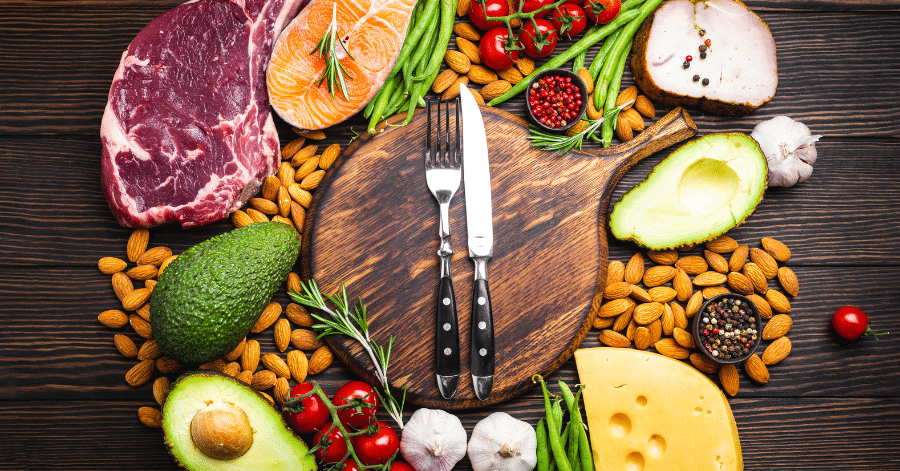Why the Keto Diet Has Gained So Much Popularity Recently
Even if you’re young or don’t read about diet and health, you’re probably aware of a tremendous shift in the kinds of foods that Americans started producing and buying over the last few decades. Keto diet is one of the prescribed solutions to counteract the effects of processed foods in our diet.
We eat more processed foods, fewer fresh foods, and larger portions than our grandparents and great-grandparents did, and it’s showing up as epidemics in obesity and metabolic diseases among every age group. By eating trans fats, hydrogenated oils, sugar (especially high-fructose corn syrup), and factory-raised animals who are fed unnatural diets and live under stressful conditions, we have lowered the amount of nutrients our bodies get, while upping the calorie count.
The problem was compounded by misguided advice that urged us all to eat fewer fats and more carbohydrates. The low-fat, high-carb approach to dieting led to unsustainable weight loss, weight regain, and spikes in insulin that trigger fat storage.
Burning a New Type of Fuel
The ketogenic (keto) diet is a low-carbohydrate approach to eating that might seem counterintuitive the first time you hear about it. Instead of limiting dietary fat, keto aims to train your body to burn fat by cutting out sugar and high-glycemic carbohydrates such as bread, pasta, and white potatoes.
Keto puts your body into a metabolic state called “ketosis,” in which all the calories you need come from energy-rich ketones produced by your liver after it digests fatty acids. Expert doctor and surgeon Dr. Christopher Ibikunle of the Atlanta Body Institute in Atlanta, recommends keto for individuals who want to:
- Lose weight.
- Lower cholesterol.
- Lower blood sugar.
- Eliminate brain fog.
- Increase energy levels.
- Improve overall health.
- Reduce disease-causing inflammation.
The keto diet originated decades ago to help children who had epilepsy. It’s also used to treat or prevent other diseases, including type 2 diabetes and polycystic ovarian syndrome (PCOS). Before conducting any medically supervised weight loss at the Atlanta Body Institute, our doctors perform a thorough medical exam and order a blood panel. We let you know if keto is the right diet for you.
Forget Calories, Think Keto Diet Nutrients
If you’ve counted calories when trying to lose weight, you’ll welcome Keto’s emphasis on eating sufficient quantities of whole foods without worrying about the total calorie count. Instead, Dr. Ibikunle and the rest of our team urge you to focus on the nutritional value of the foods you eat, as well as their quality.
The first step is to eliminate high-carb foods that cause your body to store fat rather than burn it, as well as foods that cause inflammation, including:
- Cheese.
- All processed foods.
- Legumes (beans and peanuts).
- Conventional, unfermented dairy.
- Grains (including whole grains, breads, and pasta).
- Starchy vegetables (white potatoes, too many yams).
- Sugars (including honey, agave, and high-glycemic fruits such as cherries).
On the keto diet, you get about 75% of your energy from high-quality fats, 20% from grass-fed, pastured animal protein (including fatty fish and eggs), and 5% from carbohydrates.
Most vegetables are low in carbs but are supercharged with nutrients, so you can enjoy as many as you like. Add rich fats like grass-fed butter, ghee, and olive oil to steamed, sauteed, or raw veggies for added flavor on a high-fat diet.
Don’t Guess About the Keto Diet
Having a procedure at IBI, you’ll know whether your body has gone into ketosis and is burning ketones for energy, instead of sugar. Moreover, we’re also here to help you learn how to adjust to new ways of eating and thinking about food.
Don’t fear cutting out bread and cake on the keto diet. Embrace the diverse range of mouthwatering flavors and textures it introduces. Moreover, explore tasty and satisfying fats that can be enjoyed alone or paired with vegetables:
- Avocados.
- Pastured lard.
- Virgin coconut oil.
- Grass-fed butter and ghee.
- Virgin olive oil (not for cooking).
- Bacon (pastured, uncured pork only).
- Pastured bone marrow (good for bone broth).
Unlike other low-carb diets that are sometimes mistaken for keto, a true ketogenic diet does not require protein loading. Proteins are kept to between 20% to 30% of your diet to reduce the risk of your body converting proteins to sugar (an unwanted process called gluconeogenesis). Keto-friendly protein choices include:
- Shellfish.
- Pastured eggs.
- Pastured gelatin.
- Grass beef and lamb.
- Organic turkey and chicken.
- Macadamia nuts, pecans, walnuts.
- Pastured organ meats (livers, kidneys, hearts).
- Fatty, omega-3-rich fish (salmon, mackerel, sardines).
Our team helps you identify Keto-friendly foods and can even steer you toward recipes that your whole family can enjoy. You can expect benefits such as more energy, clearer skin, and better sleep.
The keto diet, alongside exercise and proper hydration using filtered water, optimizes weight and health. Additionally, to find out if the keto diet is right for you, call us or schedule a teleconsultation.











